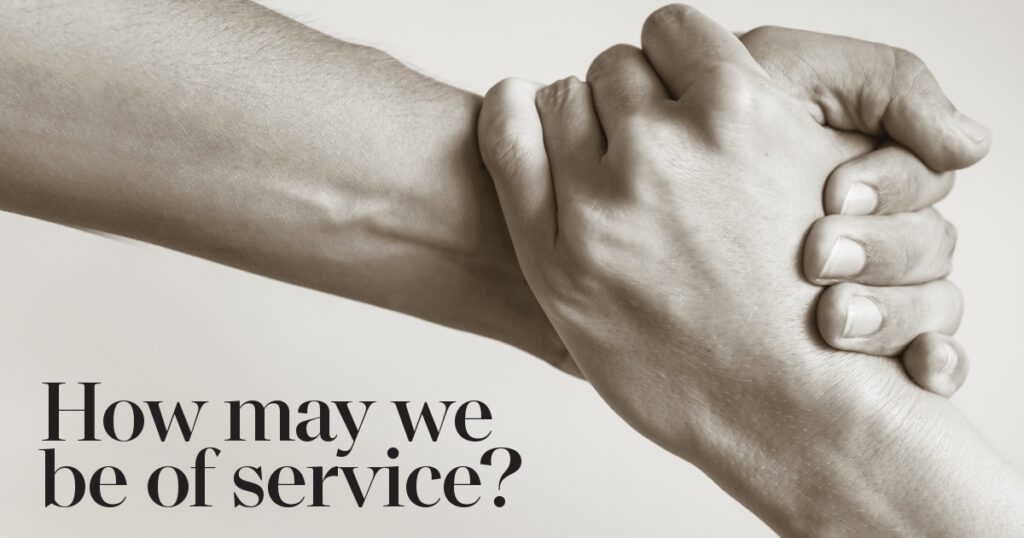01 Jul 2023 How may we be of service?
By Vivian Lawson Hogue
Some people just have a heart or training for being helpful whether on a large scale or small. My children say I am a perfectionist. I say I just like things orderly. Doesn’t everyone have a kitchen pantry with soups in alphabetical order? Surely others have shelves with category labels, purchase years written on containers with black marker and stocked on shelves with the oldest in front. Alright, so maybe they have a point, but it works. I should remind them that after I’m gone, it will be helpful to know how old the split-pea soup is and where to find the poison center number.

A person may enter the military because he or she feels they can aid our country and citizens in keeping our freedoms and culture. At times, it was by draft, other times not. With either one, the helpful results can be a sense of worth, training for self-preservation and self-sufficiency, dealing with rules, authority and personalities, and a who-o-ole lot of maturity.
Some beneficial services are for the community and can come with pay, some with not much and some not at all. While my parents were in their later years and I was working full-time, the Senior Citizens Center’s Meals-on-Wheels vehicle and a friendly delivery person would bring lunch to them. I was grateful because they made contact and fed them when I couldn’t. I doubt they were paid except with sincere thanks.
A modest income was earned by our helpful telephone operators. These women, some working at night, had to be agile using the switchboard, yet congenial and proficient. With our seven-man police department and no dispatchers, they would receive emergency calls, speak with children who just wanted to “talk to the telephone lady,” and occasionally make doctor calls for women in labor! If it involved a shared party line, a few others might know Mrs. Jones was on her way to the hospital before the doctor did.
Also in my youth, doctors made house calls when necessary. Most people had only one vehicle and it was for the husband’s work. I recall when I was age 2, our doctor came to our house as I was sick enough to need a shot. I was lying on the floor on one of mother’s handmade quilts. I haven’t liked shots since, as I wasn’t expecting to have one in my God-given “seating apparatus.” Mother may have paid him a paltry sum — not unusual for a country under financial stress from a combined nine years that included World War I, the Great Depression and World War II, not counting the harsh times of recovery after each.
There are still many “left-over” helpful people from those times because they and their children still believe in doing unto others as you would have them do unto them.
My almost-lifelong best friend, Carolyn Hazel Lewis, had a knack for caring for children both in the school classroom and in the church nursery. It was her form of service to the community and beyond. I called her a “child-whisperer” because she was. Her calm voice could calm a crying baby (or a crying friend!) like no other. She knew just how to teach the civilities of life, the enjoyment of learning and the necessity of fair play. At an early age, her son, Mark, came to assist her in the church nursery, and what a duo that was. Mark’s caring, sense of humor and learned tactfulness acquired from both Carolyn and his father, Gary Joe, provided him a natural transition into serving as a teacher and principal.
Also in those simpler times, even bankers had their helpful, personal courtesies. I recall my dad’s story of needing a small loan. Dad and the banker, Tom Wilson, agreed upon a sum and it was finalized with a handshake. A contract was mailed later. My dad would never default on the loan, but the time-honored custom came by trust and faith in each other. “A man’s honor was his bond” (or promise).
I have benefited from many who helped in ways of which I wouldn’t have thought. Once while shopping, a hurried stranger told me without slowing her cart that she liked my hairstyle. She didn’t have to say anything, but I knew she hoped it might brighten my day, and it did. In another instance, a teenage girl found my purse in my cart in a store parking lot after I drove home. She took it straight inside to customer care. When I tearfully retrieved it shortly after, there was not even a gum wrapper missing. I asked who brought it in and was told they didn’t know her name, that it was just a young woman whose T-shirt had a Christian logo.
To all of these stories, one can apply trust, faith and a desire to make someone else’s life easier. The definition of service is “contributing to the welfare of others.” A good deed done does not expect repayment. Thus we should “pay it forward,” meaning repay by doing something helpful for someone else.
Recently a young man saw me loading heavy items into my car and came over to ask if he could assist. I accepted, thanked him sincerely, and he said he was just “glad to help.” Later, I wondered if I had just received a “payment forward.” And it was now my turn.
- All for one and one for all - June 30, 2025
- Men with a mission - June 1, 2025
- A lifetime of wonder - May 11, 2025











